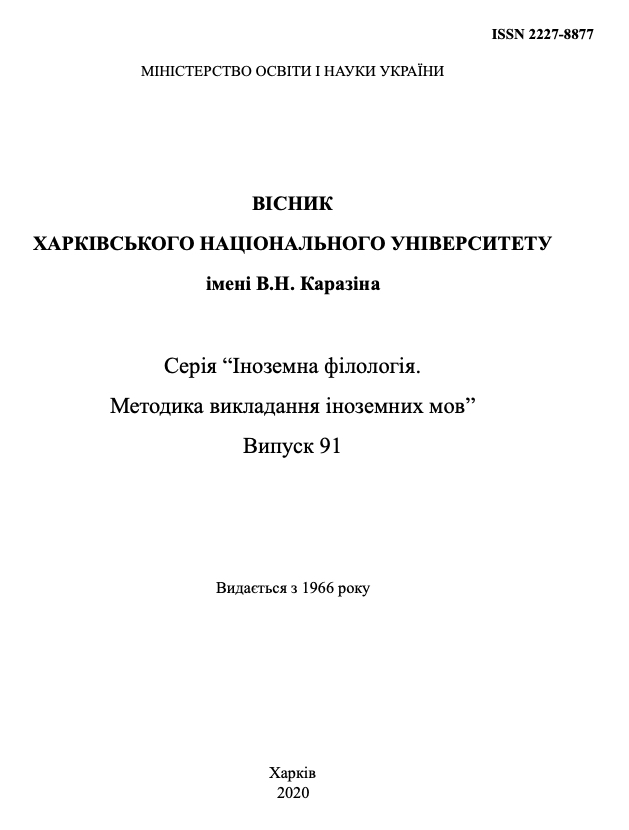Implicatures as speech means in the realization of political discourse strategies
Abstract
The article aims to analyse a declassified telephone conversation between the U.S. President Donald Trump and the Ukrainian President Volodymyr Zelensky. The object of analysis is utterances with implications that are studied on peculiarities of the implementation of strategies and tactics in the political discourse. As main characteristics of implicatures, intendability and derivability determine the strategic nature of their actualisation in the political discourse. The strategy of influence is considered the global strategy of political discourse since the main motive of politicians is to expand their electorate. In some areas of the discourse, the global strategy is fulfilled in the local strategies. At the level of speech acts, local and global strategies are fulfilled in speech strategies or tactics that are directly related to the speech characteristics of utterances. American political discourse uses the following strategies of influence: manipulation, subjectivation, populism, fascination, and simplification of information. The manipulation strategy lies in twisting the facts in order to denigrate the opponents. Using the subjectivation strategy, a politician attempts to stand out from the crowd of other politicians. The populism strategy allows a politician to pretend that their main motive is the desire to help people. The fascination strategy aim to provoke strong emotions of the recipient. These local strategies are implemented by tactics of accusation, slander, repetition, opposition, as well as colloquial and emotional-evaluative vocabulary. Corresponding speech devices serve as indicators of conversational implications. Conversational implicatures prevail over conventional ones. The analysed discourse is characterized by chains of implicatures which are used by Trump to manipulate Zelensky.
Downloads
References
Bezuglaia, L.R. (2020). Teoretyko-metodologichni zasady lingvopragmatychnyh doslidzhen dyskursu [Theoretical and methodological foundations of linguopragmatic studies of discourse]. Vid slova do dila: lingvopragmatyka dyskursu [From Word to Deed: Linguistic Pragmatics of Discourse]. Vinnytsya : Nova Knyga, 16–75. (in Ukrainian)
Belova A.D. (1999). Amerikanizm, amerikanskij politicheskij diskurs i idiostil' prezidenta Teodora Ruzvel'ta [Americanism, political discourse and Theodore Roosevelt's idiomatic style]. Vіsnik Kharkіvs'kogo derzh. un-tu [Kharkiv State University Messenger], 6–13. (in Russian)
Didenko M. O. (2001) Politychnyj vystup yak typ tekstu (na materiali vystupiv nimeczkyh politychnyh diyachiv kincya 20 stolittya). Avtoref. dyss. kand. filol. nauk [Political speech as a type of text (based on materials of speeches of German politicians of the 20th century. Cand. philol. sci. diss. Synopsis], Odesa. (in Ukrainian)
Gorina O. V. (2008) Kognityvno-komunikatyvni xarakterystyky amerykanskogo elektoralnogo dyskursu respublikanciv. Avtoref. dyss. kand. filol. nauk [Cognitive-communicative characteristics of American republican electoral discourse. Cand. philol. sci. diss. synopsis]. Kharkiv. (in Ukrainian)
Grice H. P. (1985) Logika i rechevoe obshhenie [Logic and conversation]. Novoe v zarubezhnoj lingvistike [New in Foreign Linguistis]. Moskva : Progress. № 16, 217–237. (in Russian)
Dejk, T. A. (1989). Jazyk. Poznanie. Kommunikacija [Language. Knowledge. Communication]. Moscow : Progress. (in Russian)
Kalishhuk D. M. (2017) Konceptualni styli anglomovnyh politykiv (na materiali politychnogo dyskursu prezydentiv Dzh. Busha mol., B. Obamy) Avtoref. diss. kand. filol. nauk [Conceptual styles of English-speaking politicians (based on materials of political discourse of presidents George Bush Jr. and Barak Obama. Cand. Philol. Sci. diss. synopsis] Zaporizhzhya. (In Ukrainian)
Knorozov Ju. V. (1962) Ob izuchenii fascinacii [About studies on fascination]. Voprosy jazykoznanija [Issues of Linguistics]. Vyp. 1. 163. (in Russian)
Maslova V. A. (2008) Politicheskij diskurs: jazykovye igry ili igry v slova? [Political discourse: communicative games or playing with words?]. Politicheskaja lingvistika [Political Linguistics]. Ekaterinburg, Vyp. 1(24), 43–48. (in Russian)
Kharytonova D. D. (2019) Ukrayinskyj politychnyj dyskurs: kognityvno-semantychni ta pragmakomunikatyvni vymiry. Avtoref. diss. kand. filol. nauk [Ukrainian political discourse: cognitive-semantical and pragmatical-communicative dimensions. Cand. Philol. Sci. diss. synopsis]. Kyiiv. (in Ukrainian)
Brown P., Levinson S.C. (1988) Politeness: Some universals in language usage. Cambridge University Press.
English Cambridge dictionary. Available at: https://dictionary.cambridge.org/
Grice H. P. (1993) Logik und Konversation. Handlung, Kommunikation, Bedeutung. Frankfurt, 243–265.




